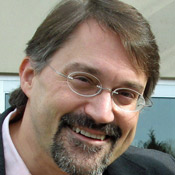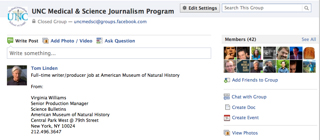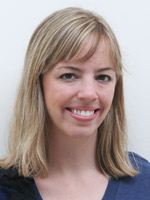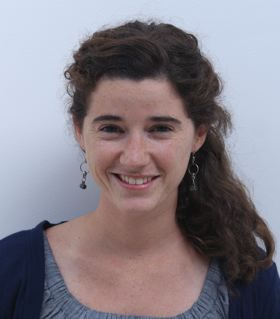The Connection October 2011
The Connection is the newsletter of the Science and Medical Journalism Program at the University of North Carolina at Chapel Hill's Hussman School of Journalism and Media.
A conversation with... David Kroll
 David Kroll, Ph.D., is professor and chair of Pharmaceutical Sciences at North Carolina Central University. He's one of the more versatile science bloggers on the web. He writes Terra Sigillata, a natural products pharmacology and chemistry blog at CENtral Science, and Take as Directed at PLoS Blogs, where he writes about everything under the sun. He also tweets @DavidKroll.
David Kroll, Ph.D., is professor and chair of Pharmaceutical Sciences at North Carolina Central University. He's one of the more versatile science bloggers on the web. He writes Terra Sigillata, a natural products pharmacology and chemistry blog at CENtral Science, and Take as Directed at PLoS Blogs, where he writes about everything under the sun. He also tweets @DavidKroll.
Q:You were a scientist before you were a writer. How did you develop your writing voice and style?
A: Writing is really just an extension of what I've always done as a scientist, particularly a pharmacologist. I have the advantage of doing science in an area that everyone considers relevant - who doesn't take at least one prescription or over-the-counter drug? Many of my blogposts are simply stories about medicine that I would tell to my students or public audiences.
My voice and style have evolved since I wrote as a music critic for my high school newspaper. Not to serve up a cliche, but I am simply myself. I write the way I talk. I practiced it on a blog for about six months before I even told my wife I was doing it. I got invited to write at the ScienceBlogs network shortly thereafter and relied on reader feedback and traffic numbers to see what appealed to others.
Q:Your blog on PLoS, Take as Directed, is refreshing because it often showcases the non-science thoughts going through your head. Do you make a conscious choice to blog about all topics?
A: Take As Directed is my space for what I playfully call, free-range blogging. I write scientifically at Take As Directed, but that's also my outlet for my more personal writing, topics that have sometimes given me greater readership than for my science writing: the effect of my long bout with pneumonia on my mental health, my belated eulogy for my father who died of alcoholism, reflections on a friend who died in the World Trade Center attacks, meeting civil rights legends like Stetson Kennedy, among others. I write about these topics to journal and reflect on life lessons I've learned. I've never really been a terribly private person so I like to share my stories. I have no real guide as to when I'll write at either blog -- it's really whatever is happening in my life that week which determines whether I write about a personal story or a hardcore scientific paper.
Q:What advice would you give to science or medical professionals who have caught the social media and communication bug?
A: Write what you know but don't be afraid to venture outside your area -- you'll actually learn from others as well as just from digging around yourself. My daughter asked me at Chick-Fil-A one morning where helium comes from in the balloons they have. Since I couldn't answer, I thought it would be a great blog topic. I know a little chemistry but I learned a ton from just venturing outside my area and then getting comments from others who knew about gas drilling and scientific uses of helium (you'll have to read my blog to learn more!).
Q:You've spoken about connecting science to underrepresented groups. How do you think science (and science blogging) can help promote social justice or battle inequalities?
A: I teach at one of the five Historically Black Colleges and Universities (HBCUs) in the UNC system, pursuing a mission I've had since cultivating students from underrepresented minorities in pharmacy back in the 1990s at the University of Colorado. I use my blog to promote my students [and talk about] issues of health disparities and challenges minorities face in scientific training. Although I'm a white male and could never fully experience what it's like to be black in the American South, I was a first-generation college student from a factory town outside New York comprised of mostly Polish immigrants. We were never expected to become much of anything, but I had the support of my parents, people who endowed scholarships, and professors who modeled what I finally realized I could be. My voice is only one, but I subscribe to the inspiration of the late historian Howard Zinn who said, "Small acts, when multiplied by millions of people, can transform the world."
Social networking:
Helping science and medical journalists connect
By Stephanie Soucheray-Grell
 Journalists today are expected to blog, tweet, friend, link and have full-time careers. It can be exhausting, especially when connections and networks provided by social media often seem intangible and ephemeral. But social media can foster valuable connections for students and alumni and aid in job hunts and other endeavors. Case in point — Facebook’s group page for UNC’s science and medical journalism program.
Journalists today are expected to blog, tweet, friend, link and have full-time careers. It can be exhausting, especially when connections and networks provided by social media often seem intangible and ephemeral. But social media can foster valuable connections for students and alumni and aid in job hunts and other endeavors. Case in point — Facebook’s group page for UNC’s science and medical journalism program.
“I saw the page as a networking tool,” said Dr. Tom Linden, director of UNC’s science and medical journalism program. “I’m constantly pulling on alumni to join. Every year more people come into the fold.”
Forty-two people have joined the group, and a steady stream of job postings and career connections line the “wall.” Those postings helped Carrie Gann, who was looking for a medical journalism job after graduating from the master’s program last spring. When she saw a posting on the Facebook group page for a production assistant job for the health section of ABCNews.com, she applied. The job posting held key information: the applicant would work with Dan Childs, a 2002 graduate of the program and health editor of ABCNews.com.
“It was really great because, as anyone who's been through the job application process knows, it can be really tough to stand out and make a connection with the person doing the hiring,” said Gann. “But the Facebook group gave me the chance to speak directly with Dan Childs, who knew what the medical journalism program was all about.”
Other students have used the Facebook page to help with research. Kelly Izlar, a second-year master’s student in the program, was working on a grant last summer at UNC’s Morehead Planetarium (see story below). She wanted to know whether scientists were interested in learning multimedia skills to help in the communication about their work and research. So Izlar posted a survey on the UNC science and medical journalism Facebook page.
“It was helpful, I got a quick response” said Izlar.
The feel of the Facebook group is less “whom you know” and more “who wants to help?” It’s an open forum for UNC’s science and medical journalism community, and so far, it’s helped members connect.
NB: If you want to join the group, you have to be a “friend” of Tom Linden. So, friend him if you’re not a friend already.
Updates from our second-year master's students:
The history of medicine
 As a writing intern with the Yale School of Medicine this summer, I was exposed to the incredible legacy of one of America's oldest medical schools and one of the world's cutting-edge research institutions. I interviewed scientists working with amyloid plaques associated with Alzheimer's, talked to researchers who discovered how nicotine receptors in the brain relate to weight control, crawled in the bowels of a dormitory where Cushing's brain tumor registry was housed, and spent the day with local high school students who traded summer at the beach for summer in the oncology lab. The clips I got from Yale Medicine magazine and the Medicine@Yale newsletter tell some of these stories.
As a writing intern with the Yale School of Medicine this summer, I was exposed to the incredible legacy of one of America's oldest medical schools and one of the world's cutting-edge research institutions. I interviewed scientists working with amyloid plaques associated with Alzheimer's, talked to researchers who discovered how nicotine receptors in the brain relate to weight control, crawled in the bowels of a dormitory where Cushing's brain tumor registry was housed, and spent the day with local high school students who traded summer at the beach for summer in the oncology lab. The clips I got from Yale Medicine magazine and the Medicine@Yale newsletter tell some of these stories.
I was lucky enough to be a intern during Yale's bicentennial celebration of the medical school. This meant that all summer renowned alums returned to New Haven. With homecoming celebrations came lectures and library displays documenting the history of medicine at Yale. From the 1847 thesis written by Yale's first black medical student to the original review of Yale in the Flexner Report, I was given a glimpse into the infancy of America's medical education system, which was much more Wild West than Halls of Ivy.
Those history lessons stay with me as I continue to write about science and medicine. Although this is a field where the new, the high-tech and the heretofore undiscovered make headlines, the roots of medicine are grounded in the past and in our ever-evolving ideas about what it means to be educated, healthy and human. That's a good story, and one that I'd like to tell.
Updates from our second-year master's students:
Preparing science communicators with multimedia skills
By Kelly Izlar
 In an age of rapidly evolving technology, science communicators are having to learn new media skills. But there are few affordable programs that can teach them what they need to know in a short period of time.
In an age of rapidly evolving technology, science communicators are having to learn new media skills. But there are few affordable programs that can teach them what they need to know in a short period of time.
In 2009 staff from the Morehead Planetarium and Science Center met with faculty and staff of the journalism school at UNC-Chapel Hill. They discussed creating a multimedia bootcamp for science communicators. The journalism school has been teaching a successful bootcamp for working reporters for more than a decade, and the Planetarium wanted to tweak this model to fit the needs of science communicators.
Although both sides were interested, the project stalled. No one knew if there was enough interest within the science community for this type of program. This is where I came in.
As the spring semester ended, I got hold of Jay Heinz, digital productions manager at Morehead. We had coffee, and I all but begged him for a summer internship at the Planetarium where I could get my feet wet in science communication. He mentioned the bootcamp. He said the Planetarium needed someone to find out if this project would stir up enthusiasm in the scientific world.
So I approached North Carolina Space Grant which funded $6,000 to research the level of interest in a multimedia bootcamp for science communicators. My research included a survey and analysis.
In the survey 297 people responded. Results indicated that science communicators were interested in learning new multimedia skills, especially camera operation and editing, scientific visualization and graphic animation.
After examining the survey results, the Planetarium and the journalism school decided to proceed with plans next summer to create a multimedia bootcamp for science communicators. The two parties are discussing curriculum development, and I look forward to being part of this process.